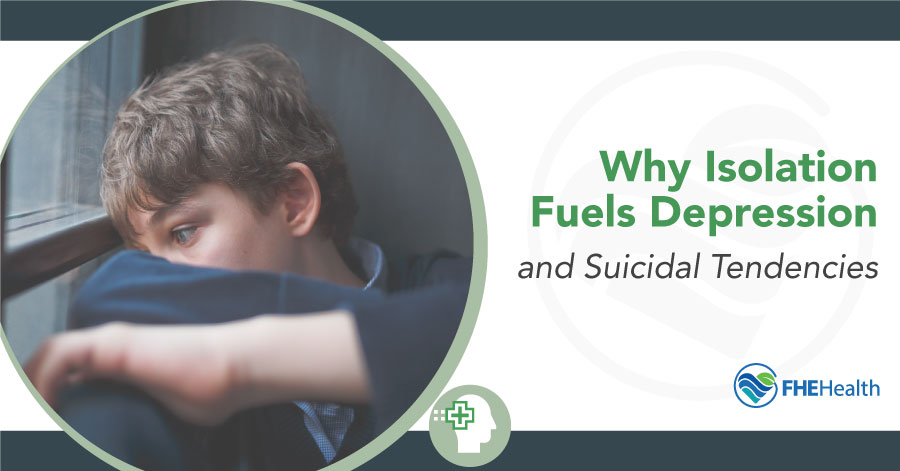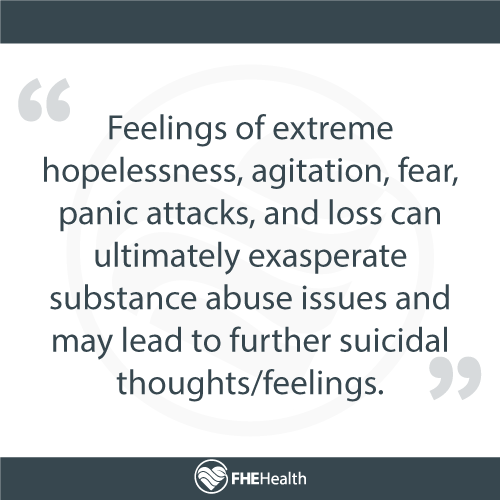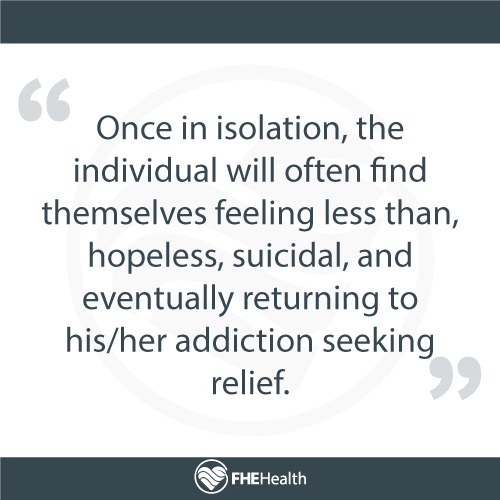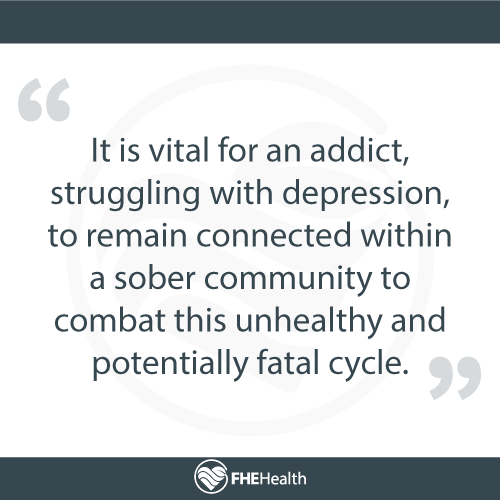
With tens of millions of Americans experiencing a mental illness each year, it’s no surprise that these conditions occasionally overlap with substance abuse disorder. To make matters worse, addicts and isolation often go hand-in-hand. As people isolate themselves, they may suffer from increased depression and self-doubt until they start contemplating suicide. Fortunately, rehab programs give them the tools to break the cycle and reconnect with their loved ones.
What Causes Isolation?
Various factors contribute to loneliness and suicidal ideation, such as:
- Mental illnesses
- Substance use disorder
- Social rejection
- History of intimate violence
- Childhood trauma
- Living in an isolated area
- Unemployment
Sometimes, people isolate themselves after a lifetime of trauma and rejection. Other times, they simply struggle to find friends because they live in rural areas or isolated communities. In any case, it’s important for loved ones to take this issue seriously.
Addiction and Depression
 Addiction and depression are considered highly comorbid; in other words, both often go hand-in-hand in a large portion of affected individuals. Many addicts, struggling with depression, self-medicate with drugs and alcohol to mitigate the symptoms. However, the relief is often temporary and generally exacerbates the symptoms of depression.
Addiction and depression are considered highly comorbid; in other words, both often go hand-in-hand in a large portion of affected individuals. Many addicts, struggling with depression, self-medicate with drugs and alcohol to mitigate the symptoms. However, the relief is often temporary and generally exacerbates the symptoms of depression.
There are common underlying factors that increase the presence of depression and addiction in an individual’s life. Environmental factors, such as where a person resides or the people that he/she surround themselves with, may have a significant impact on an individual struggling with depression or substance abuse disorder. Another factor may be the presence of a chemical imbalance within the brain or genetics.
Impact of Isolation
Isolation is prevalent in active addiction as well as in someone who is struggling with the symptoms of depression. Many turn to substances because they’re lonely and feel as though they cannot relate to others. As the disease of addiction progresses and depression worsens, most individuals find it even harder to connect and interact with other people. Further propelling isolation and loneliness, the compulsion to use other substances to self-medicate will continue to inflame the symptoms of substance abuse disorder as well as depression.
This vicious cycle often leads to further complications within the co-occurring disorders. As the addiction worsens, so do the signs of depression. The individual may find themselves struggling with suicidal ideations as they continue to isolate from potential help and healing. When an individual is clinically depressed, naturally, there is an urge to withdraw socially and shut down, which ultimately turns out to be the exact opposite of what the individual needs. Isolation will generally worsen the illness and how the individual may feel as social withdrawal amplifies the brain’s stress response.
Feelings of extreme hopelessness, agitation, fear, panic attacks and loss can ultimately exacerbate substance abuse issues and may lead to further suicidal thoughts/feelings. Individuals need to receive the proper diagnosis and treatment for all possible mental health disorders, along with receiving treatment for his/her addiction.
Isolation and Relapse
 The pull of isolation is a significant reason why many newly sober addicts experience a potential relapse. An individual will often compare their experiences to the experiences of others and begin to separate themselves from other members of the recovery community. Once this idea has started to convince the individual that they’re not a part of it, the urge to be alone may become overwhelming. Once in isolation, the individual will often find themselves feeling less than, hopeless, suicidal and eventually returning to their addiction seeking relief.
The pull of isolation is a significant reason why many newly sober addicts experience a potential relapse. An individual will often compare their experiences to the experiences of others and begin to separate themselves from other members of the recovery community. Once this idea has started to convince the individual that they’re not a part of it, the urge to be alone may become overwhelming. Once in isolation, the individual will often find themselves feeling less than, hopeless, suicidal and eventually returning to their addiction seeking relief.
These co-occurring disorders are cunning, baffling, and powerful in nature. The lack of connection to others will often lead an individual to return to old, unhealthy thought patterns, emotions, and behaviors. It’s been said, “My best thinking landed me into complete hopelessness and eventually rehab.” It is vital for an individual struggling with depression to remain connected within a sober community to combat this unhealthy and potentially fatal cycle.
How Do You Treat Isolation?
People struggling with thoughts of social isolation and suicide need immediate intervention. Inpatient rehabilitation facilities will encourage individuals to begin the process of reaching out to others and building mutually supportive and positive relationships. Connecting with other individuals who can truly understand and relate to what you may be going through is a significant benefit of seeking treatment and getting connected within a 12-Step Fellowship.
Once you begin to connect within rehabilitation or a 12-Step Fellowship, you must try to identify and relate to the experience of others rather than compare it to your own. Recognizing that you are on a journey with many others who are just like you will help give you the strength to seek connection with others while avoiding isolation. Hope can be found in the process of recovery as you become less isolated.
 In a non-emergency situation, it helps to join clubs and organizations in your area that give you the chance to meet new people. Your options may include churches, sports teams, spiritual groups, volunteer organizations, trivia nights and hobbyist meet-ups. Likewise, staying busy by exercising, journaling, going back to school, focusing on hobbies or making art could relieve feelings of loneliness and suicidal ideation.
In a non-emergency situation, it helps to join clubs and organizations in your area that give you the chance to meet new people. Your options may include churches, sports teams, spiritual groups, volunteer organizations, trivia nights and hobbyist meet-ups. Likewise, staying busy by exercising, journaling, going back to school, focusing on hobbies or making art could relieve feelings of loneliness and suicidal ideation.
You could also reach out to a counselor for advice. If you’re worried about the cost, many counselors take insurance or charge for sessions on a sliding scale. Simply having a place to vent, discuss your fears and work on building relationships could make a significant difference.
When Should You Seek Help?
Everyone feels isolated once in a while, especially when dealing with a global crisis, such as the COVID-19 pandemic. However, if the feelings persist for more than two weeks or include thoughts of suicidal ideation, consider seeking professional help.
Frequently Asked Questions
- Is there a link between addicts and isolation?
Depressed people tend to isolate themselves for various reasons. They might believe that the world is scary, assume that their friends will reject them or simply lack the energy to leave the house. Unfortunately, this lack of human contact can make their depression worse. - Does frequent isolation lead to suicidal ideation?
Isolation gives people more time to ruminate on thoughts of depression, self-harm and self-hatred. Eventually, this could lead to suicidal ideation. With no one around to stop them, depressed people might feel like they have no reason to stay alive. - How does substance use disorder play a role?
Substance use disorder is often isolating in itself. As people lose their friends, partners and careers, they may retreat further into addiction, which increases feelings of isolation and self-doubt. Ultimately, this could lead to depression and suicidal urges.
Seek Help Today
When you’re ready to reconnect with the world, FHE Rehab offers customized programs for people with mental illnesses and substance use disorders. Our team will develop a comprehensive treatment plan that includes a detox program, in-person therapy, exercise classes, aftercare and more. Reach out today to learn more about our specialty programs. We can help you verify your insurance coverage before you arrive.






